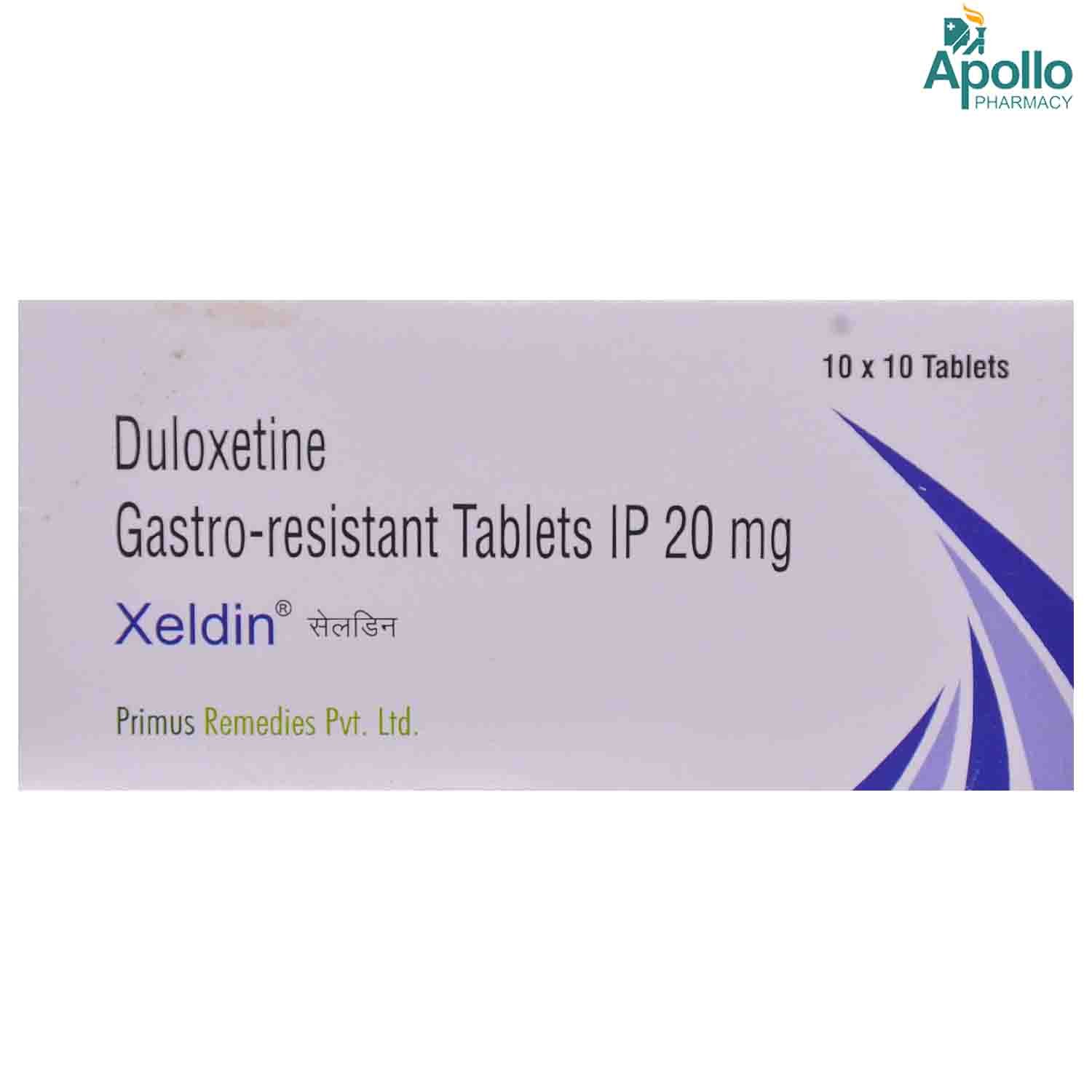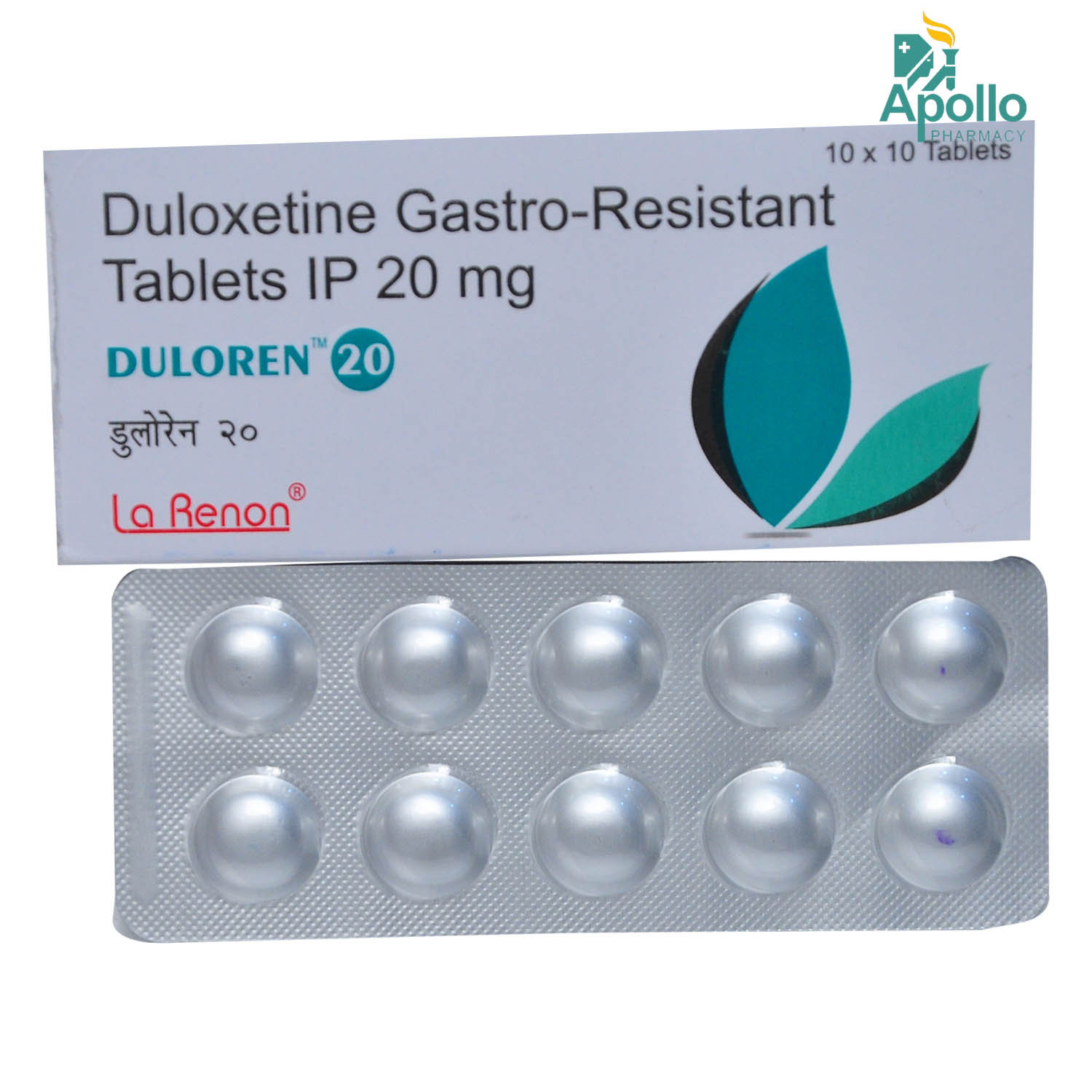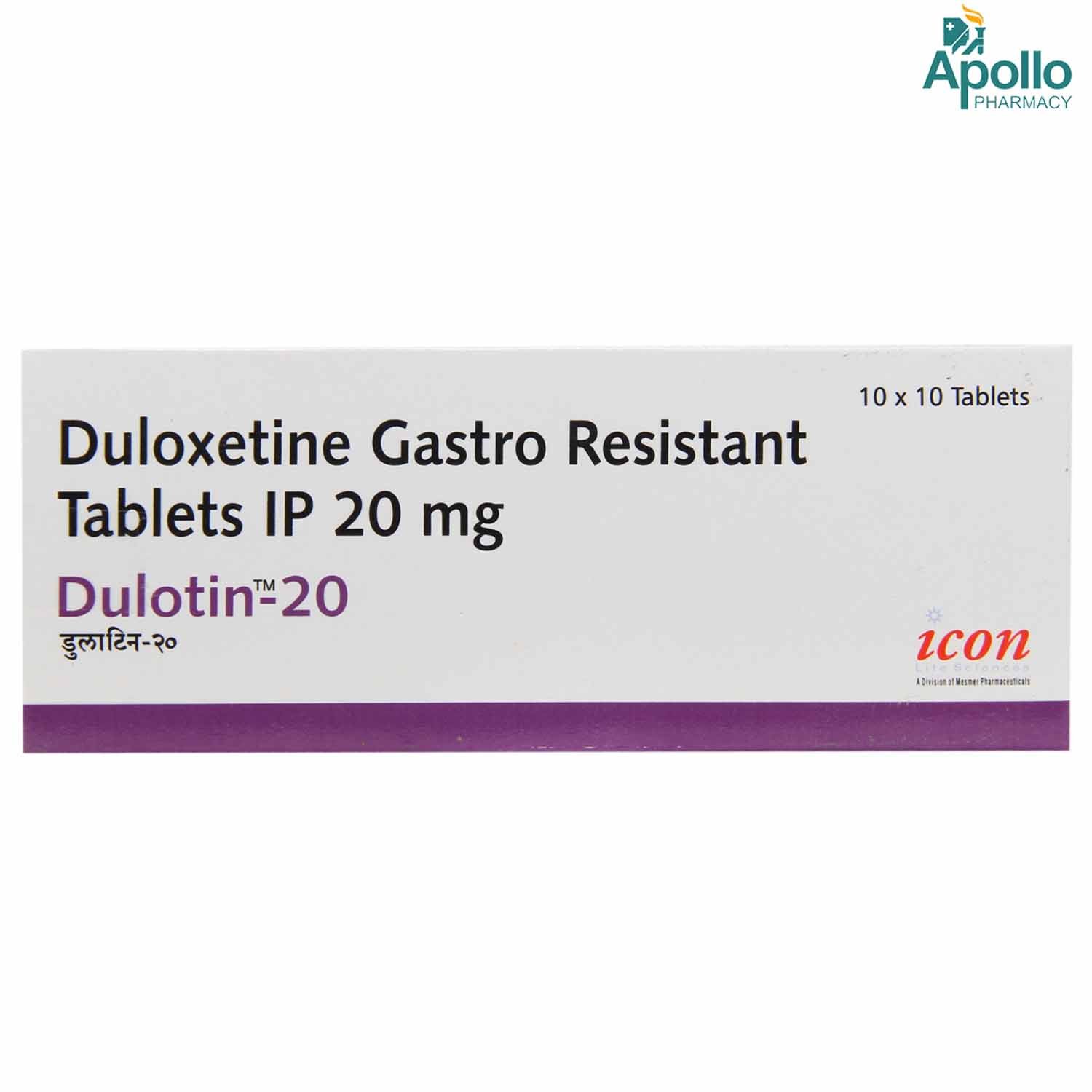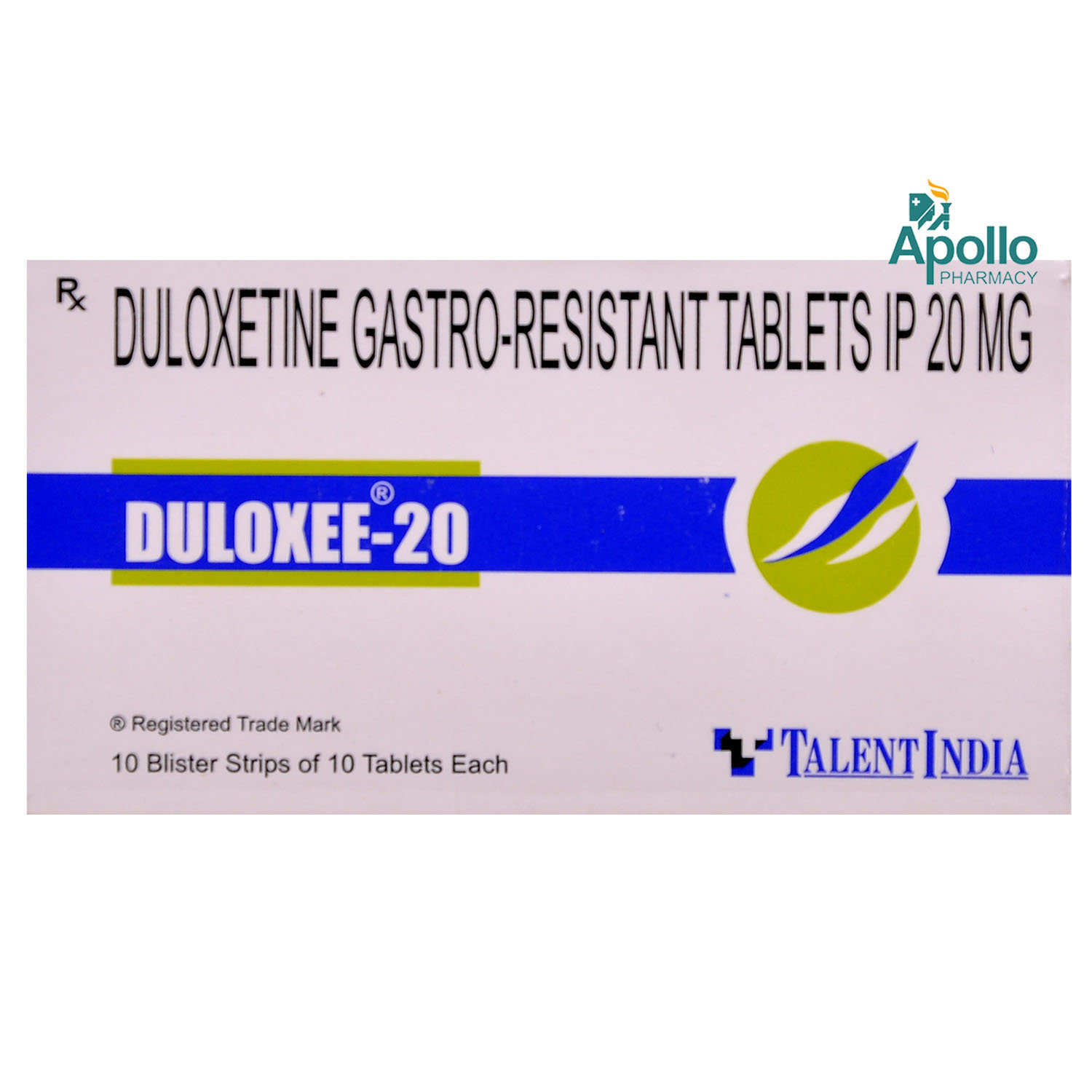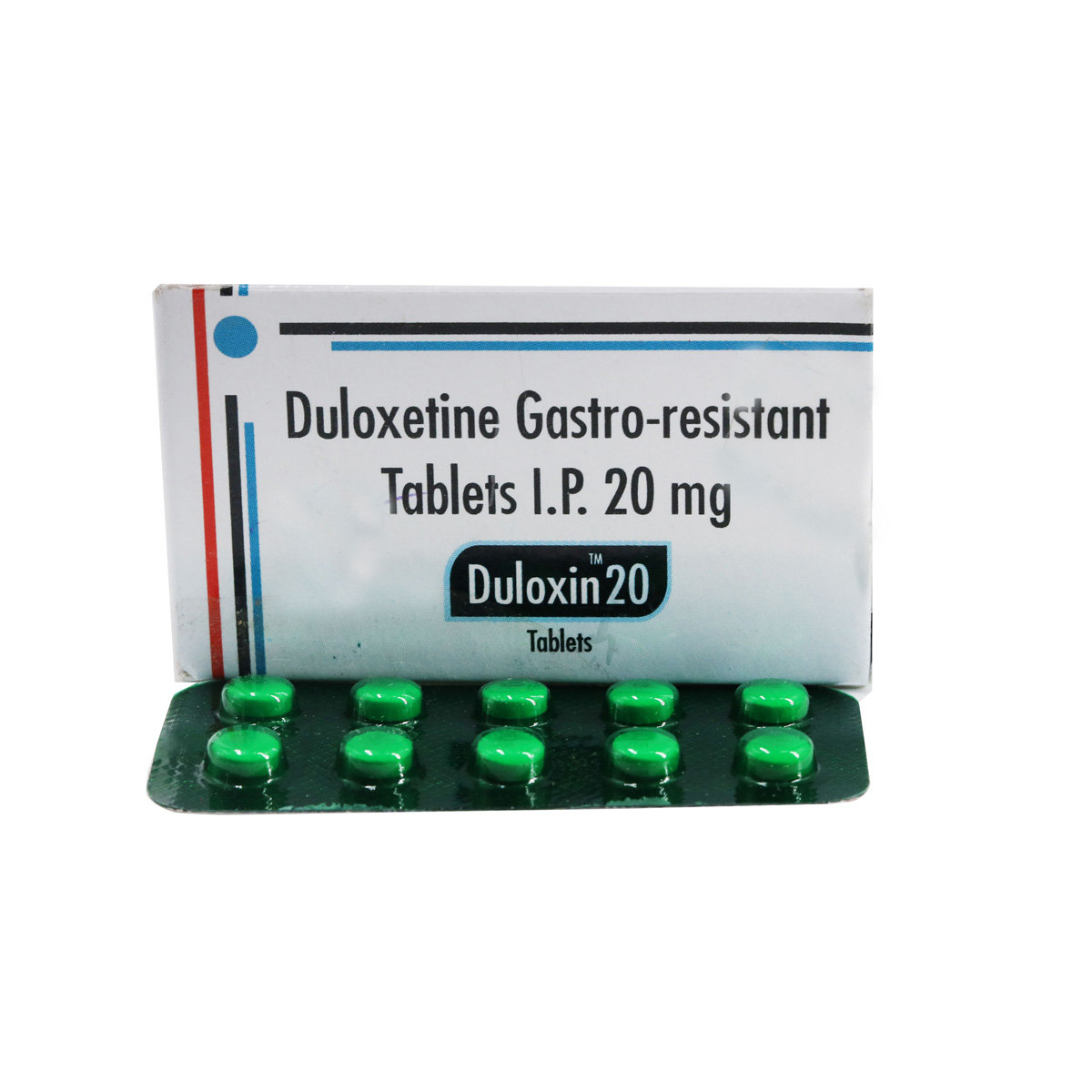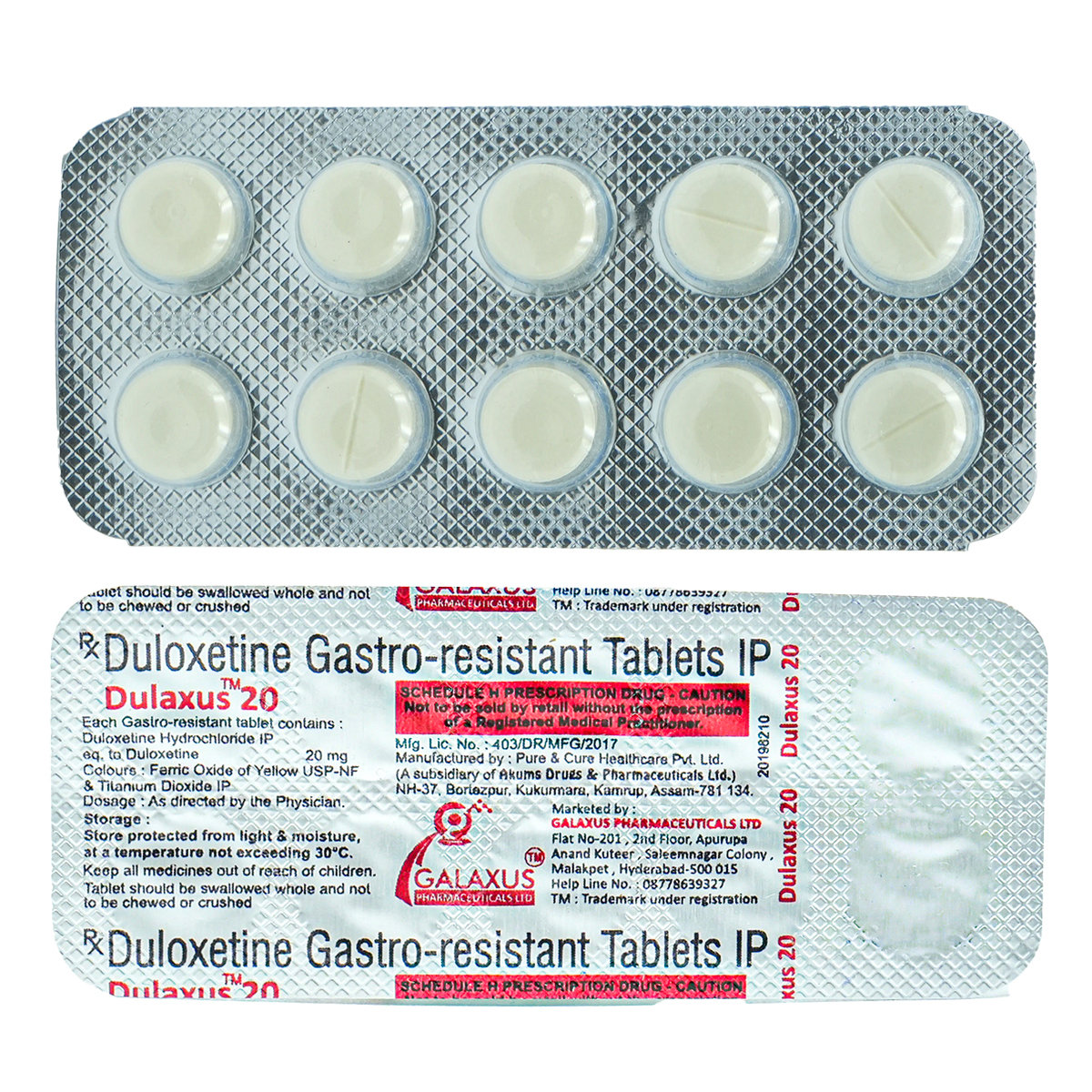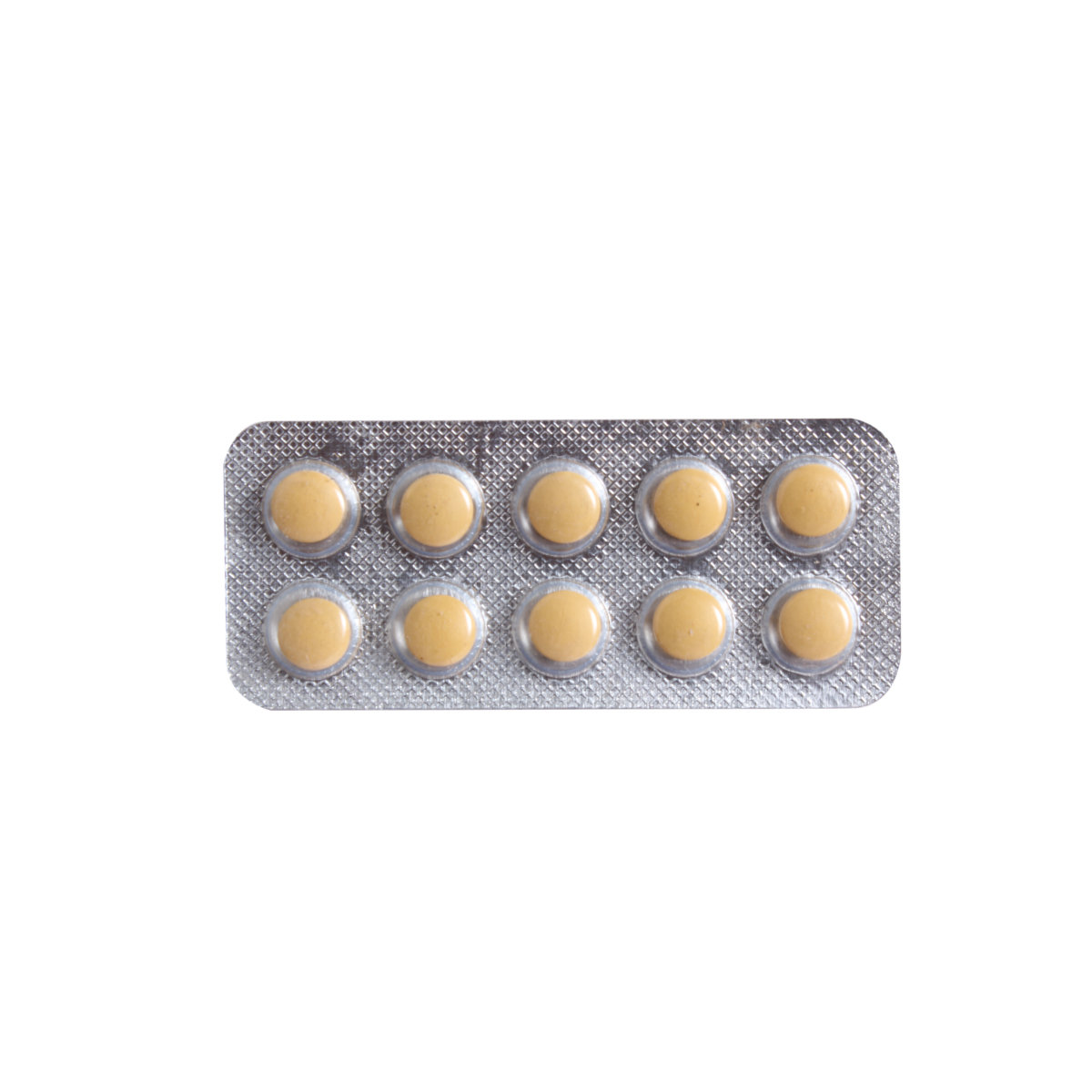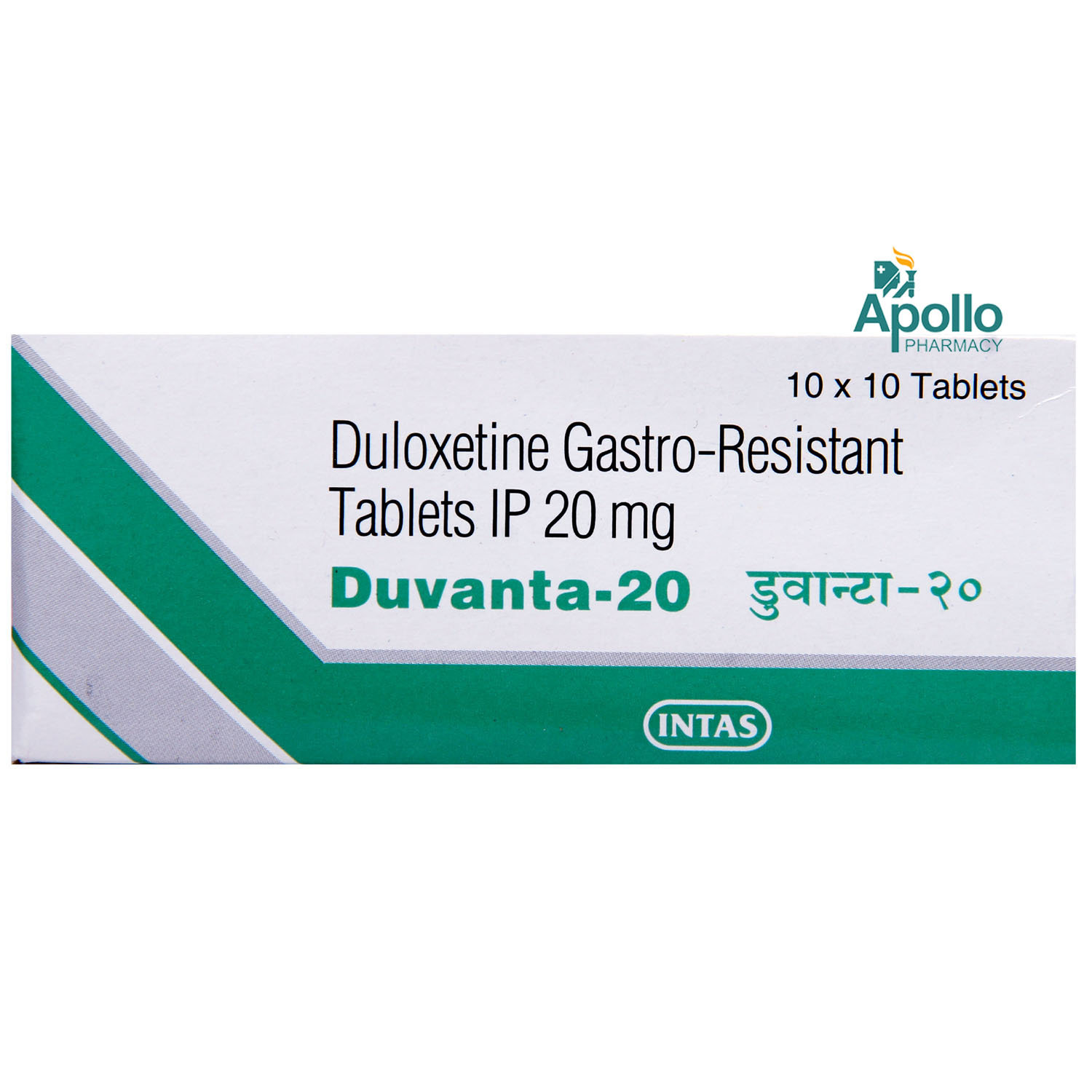Dulotor-20 mg Tablet 10's
MRP ₹98.5
(Inclusive of all Taxes)
₹14.8 Cashback (15%)
Provide Delivery Location
Online payment accepted
 Prescription drug
Prescription drugWhats That
Composition :
Manufacturer/Marketer :
Consume Type :
Expires on or after :
Return Policy :
About Dulotor-20 mg Tablet
Dulotor-20 mg Tablet belongs to a group of medicines known as Antidepressants. It is primarily used for the treatment of depression and anxiety. Besides this, it is also used to treat neuropathic pain such as fibromyalgia associated with diabetic peripheral neuropathy and can be used to treat stress urinary incontinence in women. Depression is a mental illness or disorder characterised by persistently depressed mood or loss of interest in activities, causing significant impairment in daily life. Anxiety is a feeling of unease, such as worry or fear, that can be mild or severe. Fibromyalgia, also called fibromyalgia syndrome (FMS), is a long-term condition that causes pain all over the body. Urinary incontinence is the unintentional passing of urine. It's a common problem thought to affect millions of people.
Dulotor-20 mg Tablet contains Duloxetine. It works by enhancing the amount of mood-enhancing chemicals serotonin and noradrenaline in the brain. This action of Dulotor-20 mg Tablet balances out negative emotions, improves mood, sleep, and makes a person live a better life. In this way, Dulotor-20 mg Tablet relieves depressive disorder, anxiety disorder, neuropathic pain, fibromyalgia, and many more.
Common side effects of the medicine include feeling sick, a dry mouth, headache, constipation and feeling sleepy. Most of these side effects of Dulotor-20 mg Tablet do not require medical attention and gradually resolve over time. However, if the side effects are persistent, reach out to your doctor. A person taking this drug is not allowed to stop or reduce the dosage even if they start noticing an improvement in their condition without asking their doctor, as it may cause unpleasant symptoms including vomiting, agitation, confusion, etc.
Before taking the Dulotor-20 mg Tablet , let your doctor know about all your allergic or hypersensitivity reactions to medicines or food. Inform your doctor if you are suffering from kidney, liver, or heart disease. If you are pregnant or breastfeeding, please tell your doctor so that your doctor will weigh the benefits and any potential risks before prescribing it to you. Keep your doctor informed about your health condition and all the medicines you are taking before taking the Dulotor-20 mg Tablet to rule out any side effects.
Uses of Dulotor-20 mg Tablet
Directions for Use
Key Benefits
Dulotor-20 mg Tablet is used in the treatment of depression and anxiety disorders. This medicine is also used to relieve nerve pain associated with diabetic neuropathy or chronic pain associated with arthritis or back pain. This medicine acts by restoring the balance of serotonin and norepinephrine, a natural chemical present in the brain. In this way, this drug improves mood, appetite, sleep, and energy levels in patients and gives a sense of calmness in the body. Besides this, it can be used to treat stress urinary incontinence in women.
Storage
- Avoid driving or operating machinery or activities that require high focus until you know how the medication affects you.
- Maintain a fixed sleeping schedule, create a relaxing bedtime routine and ensure your sleeping space is comfortable to maximize your sleep quality.
- Limit alcohol and caffeine as these may worsen drowsiness and disturb sleep patterns.
- Drink plenty of water as it helps with alertness and keeps you hydrated and for overall well-being.
- Moderate physical activity can improve energy levels, but avoid intense workouts right before bedtime.
- Focus on eating nutrient-rich foods such as citrus fruits, spinach, ginger, garlic, turmeric, and fermented foods to improve immunity and general health.
- Drink plenty of water to stay hydrated, and think about taking probiotics, zinc, vitamin C, and vitamin D supplements.
- Adopt healthful practices such as leading a balanced lifestyle and remaining at home when necessary.
- Avoid smoking and drinking alcohol as it can worsen your condition.
- Rest well; get enough sleep.
- Eat a balanced diet and drink enough water.
- Manage stress with yoga and meditation.
- Limit alcohol and caffeine.
- Physical activities like walking or jogging might help boost energy and make you feel less tired.
- Inform your doctor about the nausea and discuss possible alternatives to the medication or adjustments to the dosage.
- Divide your daily food intake into smaller, more frequent meals to reduce nausea.
- Opt for bland, easily digestible foods like crackers, toast, plain rice, bananas, and applesauce.
- Avoid certain foods that can trigger nausea, such as fatty, greasy, spicy, and smelly foods.
- Drink plenty of fluids, such as water, clear broth, or electrolyte-rich beverages like coconut water or sports drinks.
- Use ginger (tea, ale, or candies) to help relieve nausea.
- Get adequate rest and also avoid strenuous activities that can worsen nausea.
- Talk to your doctor about taking anti-nausea medication if your nausea is severe.
- Record when your nausea occurs, what triggers it, and what provides relief to help you identify patterns and manage your symptoms more effectively.
Drug Warnings
Dulotor-20 mg Tablet should not be allowed to be used within 5 days before or 14 days after taking an MAO inhibitor such as rasagiline, selegiline, or linezolid as it may result in serious drug interaction. Don't stop taking Dulotor-20 mg Tablet without consulting with a doctor as it may cause serious drug with drawl symptoms. At the time of consultation, tell your doctor about heart problems, high blood pressure, liver or kidney disease, slow digestion, and a seizure. You should tell your doctor if you are pregnant or breastfeeding with your doctor. Avoid doing any hazardous activity as these medicines cause sleepiness in the body, so rest only.
Drug-Drug Interactions
Drug-Drug Interactions
Login/Sign Up
Taking Tranylcypromine with Dulotor-20 mg Tablet can increase the risk of serotonin syndrome(a condition in which a chemical called serotonin increase in your body).
How to manage the interaction:
Taking Tranylcypromine with Dulotor-20 mg Tablet is not recommended but can be taken together if prescribed by a doctor. However, consult a doctor if you experience confusion, fever, excessive sweating, shivering, pain in the muscles or stiffness, stomach cramps, nausea, vomiting, and diarrhoea. Do not discontinue any medications without consulting your doctor.
Taking Dulotor-20 mg Tablet with selegiline may increase the risk of serotonin syndrome (a condition in which a chemical called serotonin increases in your body).
How to manage the interaction:
Although there is an interaction between Dulotor-20 mg Tablet and Selegiline, they can be taken together if prescribed by a doctor. However, consult a doctor if you experience confusion, fever, excessive sweating, shivering, blurred vision, pain in the muscles, stomach cramps, nausea, vomiting, and diarrhoea. Do not discontinue any medications without consulting your doctor.
Coadministration of safinamide with Dulotor-20 mg Tablet can increase the risk of serotonin syndrome (a condition in which a chemical called serotonin increases in your body).
How to manage the interaction:
Taking Safinamide with Dulotor-20 mg Tablet is not recommended as it can result in an interaction, but they can be taken together if prescribed by a doctor. However, consult a doctor if you experience confusion, fever, excessive sweating, shivering, pain in the muscles, stomach cramps, nausea, vomiting, and loose stools. Do not discontinue any medications without consulting a doctor.
Taking phenelzine with Dulotor-20 mg Tablet can increase the risk of serotonin syndrome(a condition in which a chemical called serotonin increase in your body).
How to manage the interaction:
Taking Dulotor-20 mg Tablet with Phenelzine is not recommended, but they can be taken together if prescribed by a doctor. However, consult a doctor if you experience confusion, fever, excessive sweating, shivering, blurred vision, pain in the muscles, stomach cramps, nausea, vomiting, and diarrhoea. Do not discontinue any medications without consulting your doctor.
Taking Rasagiline with Dulotor-20 mg Tablet can increase the risk of serotonin syndrome (a condition in which a chemical called serotonin increases in your body).
How to manage the interaction:
Taking Rasagiline and Dulotor-20 mg Tablet is not recommended as they can possibly result in an interaction, but they can be taken together if prescribed by a doctor. However, consult a doctor if you experience confusion, fever, excessive sweating, shivering, pain in the muscles, stomach cramps, nausea, vomiting, and loose stools. Do not discontinue any medications without consulting a doctor.
Coadministration of eliglustat and Dulotor-20 mg Tablet can significantly increase the blood levels of eliglustat. This may increase the risk of irregular heart rhythm.
How to manage the interaction:
Taking Dulotor-20 mg Tablet with Eliglustat is not recommended, but they can be taken together if prescribed by a doctor. However, consult a doctor if you experience sudden dizziness, lightheadedness, fainting, shortness of breath, slow heart rate, or weak pulse. Do not discontinue any medications without consulting your doctor.
Taking Dulotor-20 mg Tablet with Linezolid can increase the risk of serotonin syndrome(a condition in which a chemical called serotonin increase in your body).
How to manage the interaction:
Although taking Dulotor-20 mg Tablet with Linezolid is not recommended, they can be taken together if prescribed by a doctor. However, consult a doctor if you experience confusion, fever, excessive sweating, shivering, blurred vision, pain in the muscles, stomach cramps, nausea, vomiting, and diarrhoea. Do not discontinue any medications without consulting a doctor.
Coadministration of metoclopramide with Dulotor-20 mg Tablet increase the risk of serotonin syndrome(a condition in which a chemical called serotonin increase in your body).
How to manage the interaction:
Taking Metoclopramide with Dulotor-20 mg Tablet is not recommended, they can be taken together if prescribed by a doctor. However, consult a doctor if you experience any unusual symptoms. Do not discontinue any medications without consulting a doctor.
Taking Dulotor-20 mg Tablet with procarbazine can increase the risk of serotonin syndrome(a condition in which a chemical called serotonin increase in your body).
How to manage the interaction:
Taking Dulotor-20 mg Tablet with Procarbazine is not recommended, but they can be taken together if prescribed by a doctor. However, consult a doctor if you experience confusion, fever, excessive sweating, shivering or shaking, pain in the muscles, stomach cramps, nausea, vomiting, and diarrhoea. Do not discontinue any medications without consulting your doctor.
Taking Dulotor-20 mg Tablet with Escitalopram can increase the risk of serotonin syndrome(a condition in which a chemical called serotonin increase in your body).
How to manage the interaction:
Although taking Dulotor-20 mg Tablet with Escitalopram can possibly result in an interaction, they can be taken together if prescribed by a doctor. However, consult a doctor if you experience confusion, fever, excessive sweating, shivering, blurred vision, pain in the muscles, stomach cramps, nausea, vomiting, and diarrhea. Do not discontinue any medications without consulting your doctor.
Drug-Food Interactions
Drug-Food Interactions
Login/Sign Up
Diet & Lifestyle Advise
- Eat healthy foods that can improve the overall mood. The easiest way to do so is to cut out junk food. Avoid food high in saturated fats and include Omega-3s and omega-6-rich food such as fish, nuts, fresh fruits and vegetables, and olive oil in your diet.
- Neurotransmitters are responsible for keeping good mental health, so these neurotransmitters are made up of amino acids. Include amino acids in your diet as these food play an important role in improving mental health.
- Exercise is the best way to relax the body as it helps the body to produce more antidepressants which in turn alleviate depression.
- Losing weight is an important step that improves overall self-esteem and health so if you are overweight, then try to lose weight and manage it according to body mass index.
- Meditation is the best way to relax the body and relieve stress.
- Try to do deep breathing exercises, which help to calm down your mind and let you sleep better.
- Lying awake in bed does not calm down the brain, so it is important to have a good night's sleep. Thus take 7- 8 hours of sound sleep.
Side Effects of Dulotor-20 mg Tablet
- Difficulty sleeping
- Headaches
- Feeling dizzy
- Blurred vision
- Constipation
- Diarrhoea
- Feeling sick (nausea)
- Being sick (vomiting)
- Dry mouth
- Sweating
- Tiredness
- Less appetite
- Weight loss
- Feeling less interested in sex
- Erection issues
Habit Forming
Therapeutic Class
All Substitutes & Brand Comparisons
RX
Duxel 20 Tablet 10's
Tripada Healthcare Pvt Ltd
₹65.5
(₹5.9 per unit)
33% CHEAPERRX
Dulodep 20 Tablet 10's
East West Pharma India Pvt Ltd
₹73.5
(₹6.62 per unit)
25% CHEAPERRX
Xeldin 20 Tablet 10's
Primus Remedies Pvt Ltd
₹82
(₹7.39 per unit)
16% CHEAPER
Drug-Diseases Interactions
Drug-Diseases Interactions
Login/Sign Up
FAQs
Drug-Drug Interactions Checker List
- CLOPIDOGREL
- WARFARIN
- IBUPROFEN
- CIPROFLOXACIN
- LINEZOLID
Special Advise
- Do not make any change in your dosing schedule without asking the doctor.
Disease/Condition Glossary
Major depressive disorder: Major depressive disorder is a mental disorder that affects the mood, behaviour, and physical activities of a person. The common symptoms of depression include reduced interest in daily activities, changes in appetite, sudden weight loss or gain, changes in sleeping patterns, restlessness, slowed movement, and speech and tiredness.
Generalized anxiety disorder or GAD: Generalized anxiety disorder is a mental illness that makes a person worry more than normal. Common signs and symptoms of GAD include Fatigue, Shaking, restlessness, problems in focusing, trouble in sleeping, feeling jumpy or dizzy, nausea, vomiting, diarrhoea, or shortness of breath.
Diabetic neuropathy: In this condition, nerves of the body get damaged by the high blood sugar in the body. This condition especially affects the nerves of the legs and feet. The common symptoms of this disease include bloating, diarrhoea, constipation, heartburn, nausea, vomiting, and dizziness.
Fibromyalgia: Fibromyalgia is a long-term condition that causes musculoskeletal pain, followed by sleeping issues, fatigue, memory, and mood issues. It can start at any age and is more seen in women than in men. The pain may be triggered by physical injury, hormonal change, or emotional trauma. The common symptoms of fibromyalgia include pain for at least three months, tiredness, trouble falling or staying asleep, shortness of breath, headaches, memory problems, difficulty in concentrating, or anxiety.

Have a query?
Alcohol
Safe if prescribed
Taking the drug along with alcohol may increase the side effects such as confusion, drowsiness, and trouble concentration. A few people may find it difficult to do mental tasks. A person needs to limit the use of alcohol while being treated with this medicine.
Pregnancy
Consult your doctor
Dulotor-20 mg Tablet is only suggested to use in pregnancy if suggested by the doctor. This medicine increases the risk of deformities in infants, so one should tell their doctor if they are pregnant.
Breast Feeding
Consult your doctor
Let your doctor know if you are a nursing mother before taking Dulotor-20 mg Tablet ; your doctor will decide whether Dulotor-20 mg Tablet can be taken by breastfeeding mothers or not.
Driving
Safe if prescribed
Dulotor-20 mg Tablet can cause sleepiness or may affect a person's ability to drive so one should avoid driving or doing any work that needs clear attention.
Liver
Consult your doctor
Dulotor-20 mg Tablet is restricted to use in patients dealing with liver disease. Inform your doctor if you have any preexisting liver disease. Your doctor will weigh the benefits and potential risks before prescribing Dulotor-20 mg Tablet .
Kidney
Consult your doctor
Dulotor-20 mg Tablet is not approved to use in patients dealing with severe kidney disease.
Children
Safe if prescribed
The usage of Dulotor-20 mg Tablet is not allowed in children below seven years old. However, this medicine can be used in children above seven years after a doctor's recommendation.






